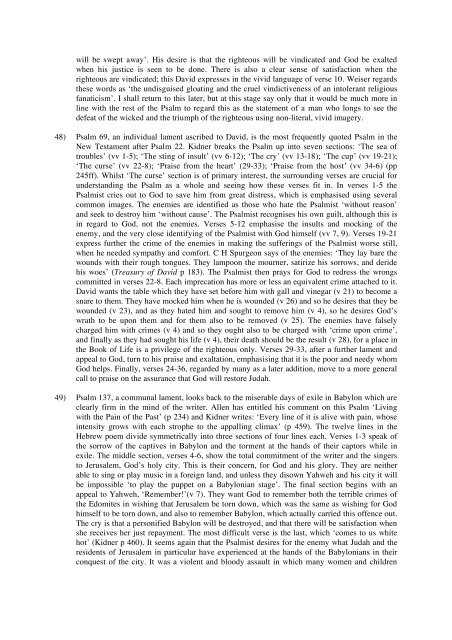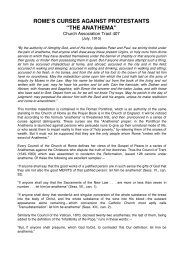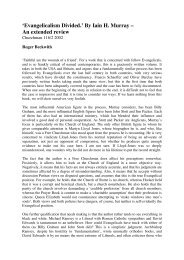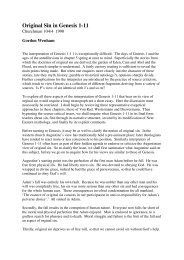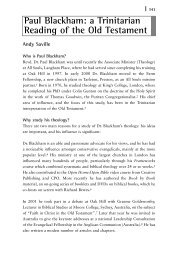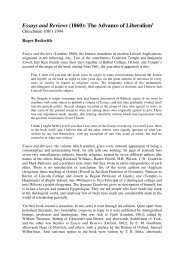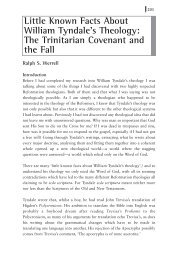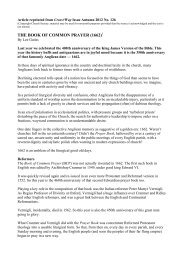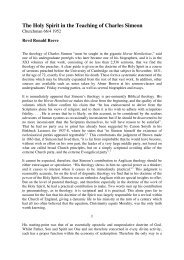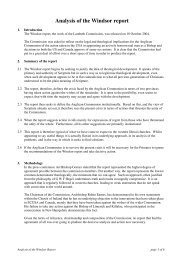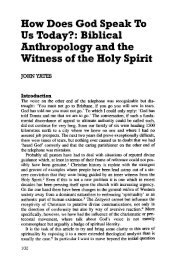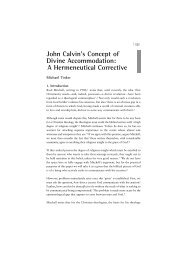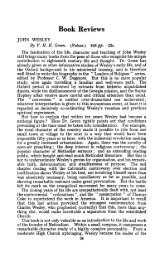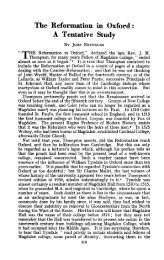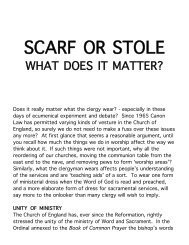The Place of the Imprecatory Psalms in the Canon ... - Church Society
The Place of the Imprecatory Psalms in the Canon ... - Church Society
The Place of the Imprecatory Psalms in the Canon ... - Church Society
You also want an ePaper? Increase the reach of your titles
YUMPU automatically turns print PDFs into web optimized ePapers that Google loves.
will be swept away’. His desire is that <strong>the</strong> righteous will be v<strong>in</strong>dicated and God be exalted<br />
when his justice is seen to be done. <strong>The</strong>re is also a clear sense <strong>of</strong> satisfaction when <strong>the</strong><br />
righteous are v<strong>in</strong>dicated; this David expresses <strong>in</strong> <strong>the</strong> vivid language <strong>of</strong> verse 10. Weiser regards<br />
<strong>the</strong>se words as ‘<strong>the</strong> undisguised gloat<strong>in</strong>g and <strong>the</strong> cruel v<strong>in</strong>dictiveness <strong>of</strong> an <strong>in</strong>tolerant religious<br />
fanaticism’. I shall return to this later, but at this stage say only that it would be much more <strong>in</strong><br />
l<strong>in</strong>e with <strong>the</strong> rest <strong>of</strong> <strong>the</strong> Psalm to regard this as <strong>the</strong> statement <strong>of</strong> a man who longs to see <strong>the</strong><br />
defeat <strong>of</strong> <strong>the</strong> wicked and <strong>the</strong> triumph <strong>of</strong> <strong>the</strong> righteous us<strong>in</strong>g non-literal, vivid imagery.<br />
48) Psalm 69, an <strong>in</strong>dividual lament ascribed to David, is <strong>the</strong> most frequently quoted Psalm <strong>in</strong> <strong>the</strong><br />
New Testament after Psalm 22. Kidner breaks <strong>the</strong> Psalm up <strong>in</strong>to seven sections: ‘<strong>The</strong> sea <strong>of</strong><br />
troubles’ (vv 1-5); ‘<strong>The</strong> st<strong>in</strong>g <strong>of</strong> <strong>in</strong>sult’ (vv 6-12); ‘<strong>The</strong> cry’ (vv 13-18); ‘<strong>The</strong> cup’ (vv 19-21);<br />
‘<strong>The</strong> curse’ (vv 22-8); ‘Praise from <strong>the</strong> heart’ (29-33); ‘Praise from <strong>the</strong> host’ (vv 34-6) (pp<br />
245ff). Whilst ‘<strong>The</strong> curse’ section is <strong>of</strong> primary <strong>in</strong>terest, <strong>the</strong> surround<strong>in</strong>g verses are crucial for<br />
understand<strong>in</strong>g <strong>the</strong> Psalm as a whole and see<strong>in</strong>g how <strong>the</strong>se verses fit <strong>in</strong>. In verses 1-5 <strong>the</strong><br />
Psalmist cries out to God to save him from great distress, which is emphasised us<strong>in</strong>g several<br />
common images. <strong>The</strong> enemies are identified as those who hate <strong>the</strong> Psalmist ‘without reason’<br />
and seek to destroy him ‘without cause’. <strong>The</strong> Psalmist recognises his own guilt, although this is<br />
<strong>in</strong> regard to God, not <strong>the</strong> enemies. Verses 5-12 emphasise <strong>the</strong> <strong>in</strong>sults and mock<strong>in</strong>g <strong>of</strong> <strong>the</strong><br />
enemy, and <strong>the</strong> very close identify<strong>in</strong>g <strong>of</strong> <strong>the</strong> Psalmist with God himself (vv 7, 9). Verses 19-21<br />
express fur<strong>the</strong>r <strong>the</strong> crime <strong>of</strong> <strong>the</strong> enemies <strong>in</strong> mak<strong>in</strong>g <strong>the</strong> suffer<strong>in</strong>gs <strong>of</strong> <strong>the</strong> Psalmist worse still,<br />
when he needed sympathy and comfort. C H Spurgeon says <strong>of</strong> <strong>the</strong> enemies: ‘<strong>The</strong>y lay bare <strong>the</strong><br />
wounds with <strong>the</strong>ir rough tongues. <strong>The</strong>y lampoon <strong>the</strong> mourner, satirize his sorrows, and deride<br />
his woes’ (Treasury <strong>of</strong> David p 183). <strong>The</strong> Psalmist <strong>the</strong>n prays for God to redress <strong>the</strong> wrongs<br />
committed <strong>in</strong> verses 22-8. Each imprecation has more or less an equivalent crime attached to it.<br />
David wants <strong>the</strong> table which <strong>the</strong>y have set before him with gall and v<strong>in</strong>egar (v 21) to become a<br />
snare to <strong>the</strong>m. <strong>The</strong>y have mocked him when he is wounded (v 26) and so he desires that <strong>the</strong>y be<br />
wounded (v 23), and as <strong>the</strong>y hated him and sought to remove him (v 4), so he desires God’s<br />
wrath to be upon <strong>the</strong>m and for <strong>the</strong>m also to be removed (v 25). <strong>The</strong> enemies have falsely<br />
charged him with crimes (v 4) and so <strong>the</strong>y ought also to be charged with ‘crime upon crime’,<br />
and f<strong>in</strong>ally as <strong>the</strong>y had sought his life (v 4), <strong>the</strong>ir death should be <strong>the</strong> result (v 28), for a place <strong>in</strong><br />
<strong>the</strong> Book <strong>of</strong> Life is a privilege <strong>of</strong> <strong>the</strong> righteous only. Verses 29-33, after a fur<strong>the</strong>r lament and<br />
appeal to God, turn to his praise and exaltation, emphasis<strong>in</strong>g that it is <strong>the</strong> poor and needy whom<br />
God helps. F<strong>in</strong>ally, verses 24-36, regarded by many as a later addition, move to a more general<br />
call to praise on <strong>the</strong> assurance that God will restore Judah.<br />
49) Psalm 137, a communal lament, looks back to <strong>the</strong> miserable days <strong>of</strong> exile <strong>in</strong> Babylon which are<br />
clearly firm <strong>in</strong> <strong>the</strong> m<strong>in</strong>d <strong>of</strong> <strong>the</strong> writer. Allen has entitled his comment on this Psalm ‘Liv<strong>in</strong>g<br />
with <strong>the</strong> Pa<strong>in</strong> <strong>of</strong> <strong>the</strong> Past’ (p 234) and Kidner writes: ‘Every l<strong>in</strong>e <strong>of</strong> it is alive with pa<strong>in</strong>, whose<br />
<strong>in</strong>tensity grows with each strophe to <strong>the</strong> appall<strong>in</strong>g climax’ (p 459). <strong>The</strong> twelve l<strong>in</strong>es <strong>in</strong> <strong>the</strong><br />
Hebrew poem divide symmetrically <strong>in</strong>to three sections <strong>of</strong> four l<strong>in</strong>es each. Verses 1-3 speak <strong>of</strong><br />
<strong>the</strong> sorrow <strong>of</strong> <strong>the</strong> captives <strong>in</strong> Babylon and <strong>the</strong> torment at <strong>the</strong> hands <strong>of</strong> <strong>the</strong>ir captors while <strong>in</strong><br />
exile. <strong>The</strong> middle section, verses 4-6, show <strong>the</strong> total commitment <strong>of</strong> <strong>the</strong> writer and <strong>the</strong> s<strong>in</strong>gers<br />
to Jerusalem, God’s holy city. This is <strong>the</strong>ir concern, for God and his glory. <strong>The</strong>y are nei<strong>the</strong>r<br />
able to s<strong>in</strong>g or play music <strong>in</strong> a foreign land, and unless <strong>the</strong>y disown Yahweh and his city it will<br />
be impossible ‘to play <strong>the</strong> puppet on a Babylonian stage’. <strong>The</strong> f<strong>in</strong>al section beg<strong>in</strong>s with an<br />
appeal to Yahweh, ‘Remember!’(v 7). <strong>The</strong>y want God to remember both <strong>the</strong> terrible crimes <strong>of</strong><br />
<strong>the</strong> Edomites <strong>in</strong> wish<strong>in</strong>g that Jerusalem be torn down, which was <strong>the</strong> same as wish<strong>in</strong>g for God<br />
himself to be torn down, and also to remember Babylon, which actually carried this <strong>of</strong>fence out.<br />
<strong>The</strong> cry is that a personified Babylon will be destroyed, and that <strong>the</strong>re will be satisfaction when<br />
she receives her just repayment. <strong>The</strong> most difficult verse is <strong>the</strong> last, which ‘comes to us white<br />
hot’ (Kidner p 460). It seems aga<strong>in</strong> that <strong>the</strong> Psalmist desires for <strong>the</strong> enemy what Judah and <strong>the</strong><br />
residents <strong>of</strong> Jerusalem <strong>in</strong> particular have experienced at <strong>the</strong> hands <strong>of</strong> <strong>the</strong> Babylonians <strong>in</strong> <strong>the</strong>ir<br />
conquest <strong>of</strong> <strong>the</strong> city. It was a violent and bloody assault <strong>in</strong> which many women and children


